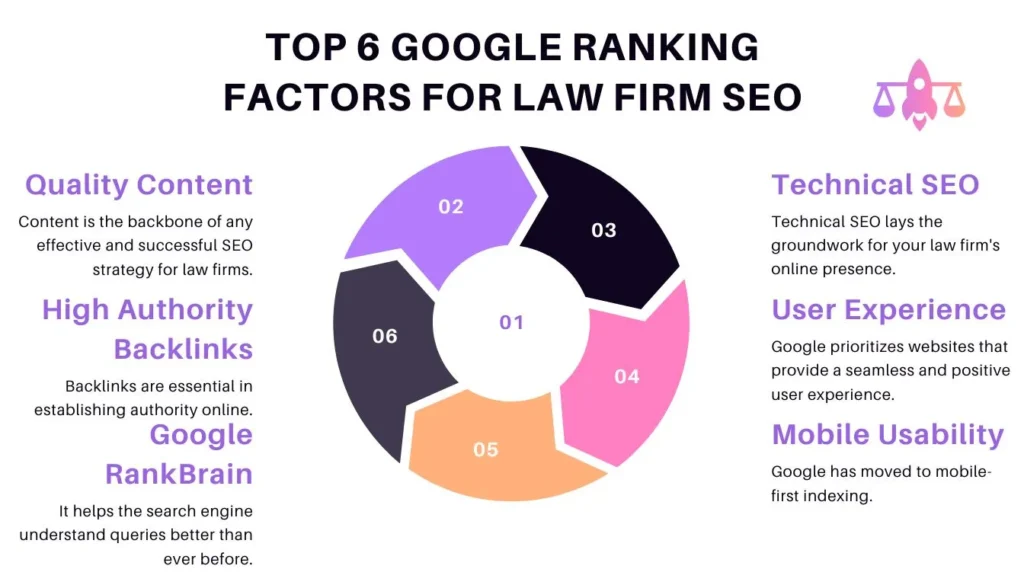In today’s digital landscape, law firms must navigate a complex web of algorithms to ensure they stand out in search results. The competition is tough, and the stakes are high, potential clients are just a click away from choosing another attorney if your firm isn’t visible online.
Understanding Google ranking factors for lawyers and law firm can be the difference between thriving in search rankings or merely surviving in this competitive field.
But what exactly drives those search engine rankings on Google or other search engines?
It’s not just about having a flashy website; it’s about mastering the art of Search Engine Optimization (SEO) tailored for lawyers. As legal professionals increasingly turn to digital marketing strategies, knowing how to optimize content effectively has become paramount.
From crafting engaging legal articles that resonate with potential clients to establishing quality backlinks that boost your firm’s authority, every detail counts.
Join us as we dive into the essential Google ranking factors specifically designed for law firms and uncover actionable insights that will elevate your online presence through organic search traffic.
It’s time to dominate search results by high ranking and secure your place at the top of competitors!
Understanding Google Ranking Factors for Lawyers
A Brief History
Google ranking factors for lawyers have evolved significantly since the search engine launched in 1998. Initially, algorithms relied on simple metrics like keyword density and backlinks.
As the web grew more complex, so did Google’s approach. The introduction of PageRank marked a major shift, prioritizing link quality over quantity. This laid the groundwork for a deeper understanding of relevance and authority.
Over time, user experience became most important. Factors such as page load speed and mobile friendliness gained importance as Google recognized that satisfying users was essential to its success.
The arrival of artificial intelligence brought another transformation. Algorithms began to interpret context and intent behind queries rather than just matching keywords.
This evolution continues today, with ongoing updates ensuring that SEO strategies must adapt rapidly to remain effective in achieving visibility for law firms online.
The Role of Artificial Intelligence and Machine Learning in SEO for Lawyers
Artificial Intelligence (AI) and Machine Learning (ML) are reshaping the digital landscape, significantly influencing Google’s search algorithms. These technologies analyze extensive data sets to understand user behavior, preferences, and intent.
For law firms, this means that content must resonate with potential clients on a deeper level.
AI-driven insights allow for more precise keyword research and audience targeting. By understanding what users seek when they query legal information, attorneys can craft tailored content that answers those specific questions.
Lawyers should embrace AI tools in their SEO strategies to enhance visibility and connect effectively with prospects seeking legal assistance online.
Top 7 Google Ranking Factors for Law Firm SEO
There are following 7 Google ranking factors for lawyers which are important for law firms SEO, attorney SEO, and help in website rankings.
- Quality Content
- High Authority Backlinks
- Google RankBrain
- Technical SEO
- User Experience
- Mobile Usability
- Local SEO

Content for Law Firm Websites

Content is the backbone of any effective and successful SEO strategy for law firms. It’s not just about quantity; quality matters immensely.
Engaging, informative content on web pages resonates with potential clients and establishes your expertise.
Topic Relevance & Intent: Conversing with Your Audience
Understanding topic relevance and intent is crucial for law firms navigating the digital landscape on Google search results. It’s about more than just creating content; it’s about connecting with your audience on a deeper level.
Consider what potential clients are genuinely searching for, what are the search terms.?
Are they looking for legal advice, information on specific cases, or local representation? Tailoring your content to meet these needs fosters engagement and trust.
Using tools like Google trends or keyword explorer can help identify trending topics within your specialty. This allows you to create relevant content and align your expertise with what people want to know, enhancing both relevance and intent in your messaging.
Keyword Inclusion: The Art of Keyword Research
Keyword inclusion is a refined skill. It’s not enough to simply stuff keywords throughout your content. Instead, think of it as relating them into the fabric of your narrative.
Start by identifying relevant keywords that resonate with potential clients searching for legal services. Integrate these target keywords naturally within headings and subheadings to enhance visibility without sacrificing clarity.
Imagine a client looking for “personal injury lawyer”, and you don’t have that keyword in your website content.
Expertise and Authority: Building Trust with Every Word
Establishing expertise and authority is critical for law firms navigating the digital landscape. When potential clients search for legal advice, they seek trustworthy sources. Your content must reflect a deep understanding of legal topics.
Use well-researched articles to showcase your knowledge. Discuss recent case studies or current laws, which demonstrate that you are in tune with industry trends. This solidifies your position as a go-to resource.
Citing reputable sources adds another layer of credibility. Link to authoritative sites when referencing statistics or established facts. It shows you’re well-versed and connected within the field.
Transparent and Accessible Language: Bridging Complexity and Comprehension
Legal jargon can often turn away potential clients. When law firms use complex terminology, they risk losing the very audience they aim to serve.
Adopting transparent and accessible language helps bridge this gap. Simplifying explanations allows clients to grasp complex legal concepts without feeling overwhelmed.
Clarity creates connections that are crucial for successful attorney-client relationships.
Engaging and Readable Format: Crafting a Visual Journey
Winning your audience requires more than just compelling content. An engaging and readable format transforms dry text into an inviting experience.
Utilizing white space effectively is key; it allows the eye to rest and guides readers through your message seamlessly. Break up large blocks of text with headings, bullet points, or numbered lists that distill complex information into digestible bites.
Incorporate visuals strategically. Infographics, images, and videos can illustrate concepts while keeping attention focused on essential details.
Up-To-Date: The Pulse of Correctness
Keeping your content fresh and relevant is essential in the ever-evolving digital landscape. Search engines prioritize up-to-date information, reflecting what users need right now.
For law firms, this means regularly updating blog posts, articles, and service pages to align with current laws or trends. Potential clients are more likely to trust a firm that showcases knowledge of recent developments.
Monitor changes in regulations and case law within your practice areas. This provides opportunities for timely insights that resonate with your audience’s needs.
YMYL: What You Need to Know
YMYL stands for “Your Money or Your Life.” It refers to content that can significantly impact a person’s financial stability, health, or safety. For law firms, this is crucial because legal advice directly affects clients’ lives.
Google holds YMYL sites to higher standards. If your content involves sensitive topics, like criminal defense or family law, you must ensure accuracy and reliability. Misinformation could lead to dire consequences for those seeking help.
E-E-A-T: Create Great Legal Content
E-E-A-T stands for Experience, Expertise, Authoritativeness, and Trustworthiness. These elements are crucial when crafting legal content that resonates with both Google and potential clients.
Experience means showcasing real-world scenarios that relate to your practice areas. Use case studies or personal anecdotes to illustrate your expertise in a relatable way.
Expertise is about having the necessary qualifications and knowledge. Highlight relevant certifications or accolades on your website to reinforce this aspect effectively.
Authoritativeness comes from being recognized within the legal community. Collaborate with reputable publications or peer-reviewed journals to gain credibility.
Trustworthiness builds through transparency and ethical practices. Ensure all information shared is accurate and provides clear references where applicable, while also addressing client concerns openly.
Incorporating E-E-A-T into your content strategy not only boosts SEO but build genuine connections with clients seeking reliable representation.
Quality Backlinks

Backlinks are essential in establishing authority online. They serve as endorsements from other websites, signalling to Google that your content is credible and valuable.
What Makes a Quality Backlink?
- Relevance
- Diversity
- Follow vs No-follow
- Anchor text
- Authority Score
Relevance: The Resonance of Contextual Connection
Relevance is more than just a buzzword; it’s the heartbeat of effective digital marketing for law firms. When it comes to backlinks, contextual connection matters significantly.
A link from a site that shares your niche or industry carries much more weight than one from an unrelated domain.
Search engines prioritize these connections because they signal trustworthiness and authority.
For law firms, gaining links from reputable legal blogs, local news outlets, or professional organizations reinforces credibility in your area of expertise.
Diversity: The Spectrum of Digital Endorsements
Diversity in backlinks is crucial for a law firm’s online presence. It’s not just about quantity but the variety of sources linking to your site. Different types of links signal to Google that your content is valued across various platforms.
Consider obtaining backlinks from legal blogs, news sites, and local directories. Each link adds a unique flavor to your digital endorsement portfolio. This variety enhances credibility and authority in Google’s eyes.
Authority Score: The Measure of Influence
Authority score is a critical metric in the world of SEO, particularly when it comes to law firm websites. It reflects how trustworthy and authoritative your domain is in the eyes of search engines.
The concept isn’t just about having a high number of backlinks; it’s also about their quality. Links from reputable websites carry more weight than those from lesser-known sources.
Follow vs. No Follow: Understanding the Signals:
Understanding the difference between follow and no-follow links is crucial for your law firm’s SEO strategy. Follow links pass authority from one site to another, enhancing your website’s credibility in Google’s eyes. These are the golden tickets that help boost rankings.
On the other hand, no-follow links don’t share that same link juice. They signal to search engines not to crawl those specific connections. While they may not directly improve your ranking, they still play a role in driving traffic and building brand awareness.
A balanced backlink profile includes both types of links.
Anchor Text: The Contextual Clue
Anchor text is more than just clickable words; it’s a powerful signal that guides search engines and users alike. When you link to content, the anchor text should provide context about what lies ahead.
Using descriptive and relevant phrases enhances clarity for your audience. It sets expectations on what they’ll find when they click through. For law firms, using precise terms related to legal services can improve relevance significantly.
Instead, mix it up with branded terms or even generic descriptors like “read more.” This strategy supports overall user experience while still conveying essential information about linked pages.
Google RankBrain – The Intelligent Algorithm Behind Search
RankBrain is a cutting-edge component of Google’s search algorithm that uses artificial intelligence. It helps the search engine understand queries better than ever before.
Understanding RankBrain
RankBrain is a groundbreaking component of Google’s search algorithm. It uses artificial intelligence to understand and process search queries more effectively than ever before.
What sets RankBrain apart is its ability to learn from user interactions. As people engage with search results, the system gathers data on what works and what doesn’t. This continual learning helps it refine future responses.
For law firms, understanding this means crafting content that resonates with potential clients’ questions and needs. Addressing specific legal concerns in a conversational manner can help you align better with how RankBrain interprets searches related to your services.
Optimizing for RankBrain: Practical Strategies for Attorney SEO
To optimize for RankBrain, attorneys need to focus on user intent.
- Start by identifying the core questions your potential clients have. Tailor your content to address those inquiries directly.
- Utilize a natural language approach in writing. This means using conversational phrases that mirror how people search online. It helps RankBrain grasp the context better and match your pages with relevant queries.
- Incorporate variations of keywords throughout your articles. Avoid stuffing; instead, let these words flow naturally within informative content.
- Engagement metrics also matter significantly. Create compelling headlines and engaging visuals to draw readers in and keep them on the page longer.
- Ensure swift website performance and mobile compatibility, both are crucial for user satisfaction and can influence how RankBrain ranks your site in search results.
Technical SEO

Technical SEO lays the groundwork for your law firm’s online presence. It ensures that search engines can crawl and index your website effectively.
- Start with site speed. A fast-loading page enhances user experience, keeping potential clients engaged longer. Use tools like Google PageSpeed Insights to identify areas for improvement.
- Next, focus on mobile optimization. With more users searching on smartphones, a responsive design is crucial. Ensure all elements display well across devices.
- Don’t overlook structured data markup. This helps search engines understand your content better and can enhance visibility in rich snippets.
- Secure your website with HTTPS; it’s a trust signal for both users and search engines.
- Maintain a clean URL structure that reflects the content of each page clearly, this not only aids crawlers but also provides clarity to visitors navigating through law firm websites.
User Experience

On-Page Experience Metrics
User experience (UX) plays a significant role in Google’s ranking algorithm, particularly after the Page Experience Update in 2021.
Google prioritizes websites that provide a seamless and positive user experience, particularly through metrics such as bounce rate and dwell time.
- Bounce Rate: The percentage of visitors who leave your website after viewing only one page. A high bounce rate indicates a poor user experience, such as irrelevant content or difficult navigation.
- Dwell Time: The length of time visitors spend on your site. Longer dwell times typically indicate that the content is engaging and relevant, which Google rewards with better rankings.
Other critical UX elements include:
Core Web Vitals
These measure the overall load time, responsiveness, and visual stability of the website.
- Largest Contentful Paint (LCP): How quickly the main content of the page loads.
- First Input Delay (FID): The time it takes for the page to become interactive.
- Cumulative Layout Shift (CLS): Visual stability, ensuring that elements don’t shift unexpectedly during load.
A website optimized for user experience encourages visitors to stay longer and engage with content. This signal to Google that the page is valuable and user-friendly.
A seamless navigation structure, clear call-to-actions, and quick access to legal information are essential for enhancing UX, which will improve your rankings.
Mobile Usability

With more than half of all searches occurring on mobile devices, mobile usability is a crucial ranking factor for law firm websites. Google has moved to mobile-first indexing, meaning the mobile version of a website is considered the primary version for ranking purposes.
Key aspects of mobile usability include:
Responsive Design
The law firm website should automatically adjust to different screen sizes, ensuring an optimal viewing experience across all devices. This helps retain users and improves engagement, as it allows easy navigation, reading, and interaction without the need for resizing or zooming.
Page Speed
Mobile users tend to have less patience for slow-loading pages. Optimizing your mobile site for faster load times by compressing images, reducing redirects, and benefiting from browser caching can drastically reduce bounce rates. This improve page SEO along with overall user satisfaction.
Tap Targets and Font Sizes
Ensure that buttons and links are large enough to be easily tapped without overlapping. Font sizes should be legible on smaller screens without the need for zooming.
Avoid Intrusive Interstitials
Pop-ups or ads that block content on mobile can negatively impact the user experience. Google may penalize sites using intrusive interstitials that disrupt access to content.
Local SEO and Google My Business Profile

Local SEO is crucial for law firms, helping them rank higher in localized search engine results, especially for potential clients searching for legal services in specific regions.
Google’s algorithm uses local ranking factors to prioritize results most relevant to a user’s location. Two major elements that can significantly impact local rankings are the Google Business Profile (GBP) and maintaining consistent local citations.
Google Business Profile (GBP)
Formerly known as Google My Business, GBP acts as the digital storefront for your law firm. It is essential to provide accurate and up-to-date information, including:
- Firm Name, Address, and Phone Number (NAP).
- Operating hours.
- Website link.
- Service areas.
Optimizing your GBP profile boosts your visibility in local organic search results, including the Google Local Pack (the map results), making it easier for potential clients to find and contact you. Google uses this information to display results for queries like “personal injury attorney near me.”
Encouraging clients to leave positive reviews on your GBP page not only improves your local SEO but also builds trust with potential clients. Reviews signal Google that your law firm is authoritative and dependable, increasing your likelihood of ranking well.
Consistent NAP+W
Consistency is key in Local SEO. Your Name, Address, Phone Number, and Website (NAP+W) should be consistent across all online platforms, such as legal directories, social media, and business listings. Any discrepancy, such as outdated addresses or incorrect phone numbers, can confuse both Google and potential clients, lowering your local rankings.
Online Local Citations
Citations from legal directories and local listings can strengthen your law firm’s local SEO. Citations are online mentions of your law firm’s NAP+W on different websites, such as industry associations or local business directories. The more quality citations you accumulate, the more credibility and visibility you gain in the eyes of Google.
Local Keyword Optimization
Including location-specific keywords in your website content, such as blog posts and service pages, enhances your visibility for local searches. For example, incorporating phrases like “Los Angeles personal injury attorney” increases the likelihood of ranking for localized search queries related to that area.
Local Link Building
Earning local backlinks from authoritative, region-specific sources (e.g., community organizations, local news outlets) also boosts local SEO. Building connections with local businesses and participating in community events increases the chances of obtaining these valuable backlinks. This signal to Google that your law firm is a trusted and respected entity in the local community.
By optimizing your Google Business Profile, maintaining accurate local citations, and focusing on local keyword optimization, your law firm can enhance its visibility in local searches and attract more clients.
Key Takeaways from Guide
Google Ranking Evolution: SEO for law firms has evolved from simple keyword use to advanced AI-driven strategies, emphasizing quality content, user experience, and relevance.
- AI & Machine Learning: These technologies help optimize content by analyzing user behavior, ensuring that content is relevant, engaging, and targeted to client needs.
- Top 7 Ranking Factors:
- Quality Content: Engaging, informative content tailored to clients’ search intent.
- High Authority Backlinks: Links from trusted sources enhance your website’s authority.
- Google RankBrain: AI-driven algorithm prioritizes user intent and engagement.
- Technical SEO: Ensuring your site is optimized for speed, security (HTTPS), and mobile usability.
- User Experience (UX): A seamless, engaging experience increases dwell time and lowers bounce rates.
- Mobile Usability: Google prioritizes mobile-first indexing; mobile optimization is crucial.
- Local SEO: Optimize your Google Business Profile and include location-specific keywords for better visibility in local searches.
- Content is King: High-quality, up-to-date legal content that resonates with clients is vital for SEO success. Relevance, intent, and keyword research are critical for boosting rankings.
- Backlink Importance: Building quality, diverse, and relevant backlinks from trusted sources strengthens SEO and authority.
- RankBrain Optimization: Creating conversational, client-focused content helps align with RankBrain’s AI-based understanding of search intent.
- User Experience Metrics: Core Web Vitals (load time, responsiveness, and visual stability) are crucial for ranking, as they reflect the site’s overall usability.
Local SEO Focus: A well-optimized Google Business Profile and consistent local citations are key to improving visibility in localized search results for law firms.
FAQ's
Google reviews build trust, improve local SEO, and increase visibility in search results, helping attract potential clients.
Key factors include quality content, high-authority backlinks, user experience, mobile usability, and local SEO.
SEO for law firms involves optimizing their website to rank higher in search results, attracting clients through relevant, targeted content and technical improvements.
The top three factors are content quality, backlinks, and user experience.



